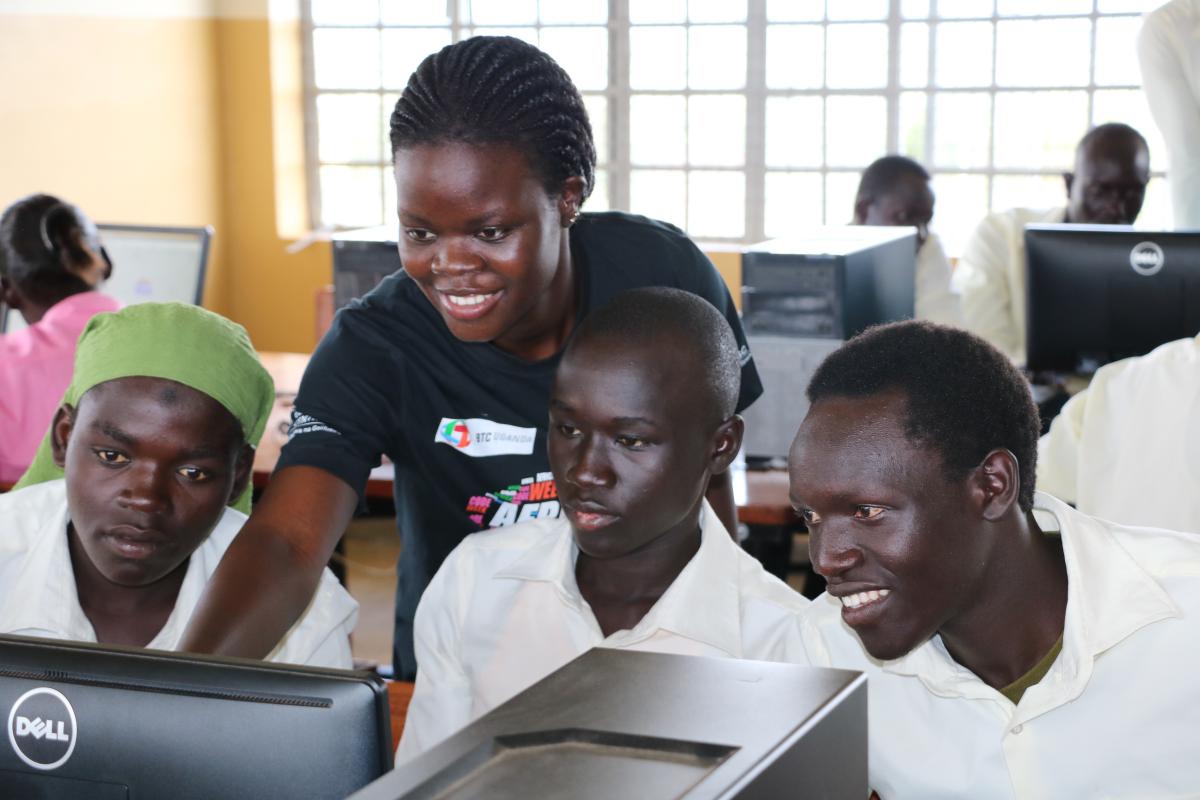Digitalization for Development: computer skills for refugees
The excitement on the faces of students at the animated motions and sound coming out of the computers is astounding. This happens to be a first-time experience for students of Lokopio Hills Vocational Training Institute (VTI) in Bidi-bidi refugee settlement in Uganda to learn coding using an easy to use software, thanks to the support from the European Union Trust Fund (EUTF).
“My first time to use computer was when I joined institute a few months ago, today am able to code using blocks and create motions of a cartoon with sound. It is this simple.” Says 20-year-old Apio Immaculate. Immaculate is one of the 90 refugee and host community youth that are undergoing the coding training at Lokopio VTI.
This year’s Africa Code Week focuses on how to use ‘scratch’, a visual programming language developed by the MIT (Massachusetts Institute of Technology) Media Lab to lower the technical threshold for coding. Coding is widely considered as the “blue collar” job of the 21st century and is introduced to trainees in order to equip them with skills that can support them in today’s world.
In Uganda, ACW 2017 partnered with a number of partner such as Makerere University as well as with Belgian Development Agency (BTC)’s Support to Skilling Uganda project with an aim to empower future generations with the coding tools and skills needed to thrive in the 21st-century workforce and become key actors in Africa's economic development.
22-year-old Matovu Joseph who awaits his graduation in Electrical Engineering, a lead trainer at Lokopio shares his experience “this is my first coding class. It is an opportunity for me to transfer knowledge to such a vulnerable group of refugees. The students have appreciated the simplicity in using scratch for coding as a programming language; it is like computerized way of building blocks”.
While taking place in Lokopio VTI with support from the European Union Trust Fund, the ACW was concurrently hosted in Buhimba VTI in Hoima district, St Daniels Comboni and Nakapiripirit VTI in Karamoja region, St Joseph Virika in Kabarole district and Kasese Youth Polytechnic in Rwenzori region with 450 beneficiaries from the respective Business Technical Vocational Education Training (BTVET).
ACW in Uganda is part of 35 African countries that are hosting over 1,500 coding workshops involving 500,000 children and youth across the continent.
The trainers of coding in Lokopio are part of the youth that were trained at Makerere University (MUK) in partnership with BTC, MUK College of Engineering, Design, Art & Technology (CEDAT), College of Computing and Information Sciences (CoCIS), Resilient Africa Network (RAN), Hive Colab and Women In Technology Uganda (WITU) to extend Africa Code Week (ACW) to BTC’s SSU project.
23-year-old Edith Ndagire, a third year Telecom Engineering student, who was trained as a trainer and was part of the instructor team at Lokopio says “the students here are enjoying the coding lessons and have grasped faster than I expected. They are disciplined”.
“As a refugee student of Agriculture at Lokopio VTI, I plan to use coding knowledge in creating awareness cartoons focusing on stopping environmental degradation in agriculture for the community” says Immaculate who comes from a refugee family of 8.
The ACW initiative empowers refugee youth such as Immaculate with skills on how to use the computer software and this put them in a good position of not only passing the knowledge to their trainees but also to create income generation for themselves. BTC’s participation in ACW targets VTIs, refugees and host community populations that are often neglected when innovative interventions such as digitalization are rolled out.
Latest news from this project
No news

